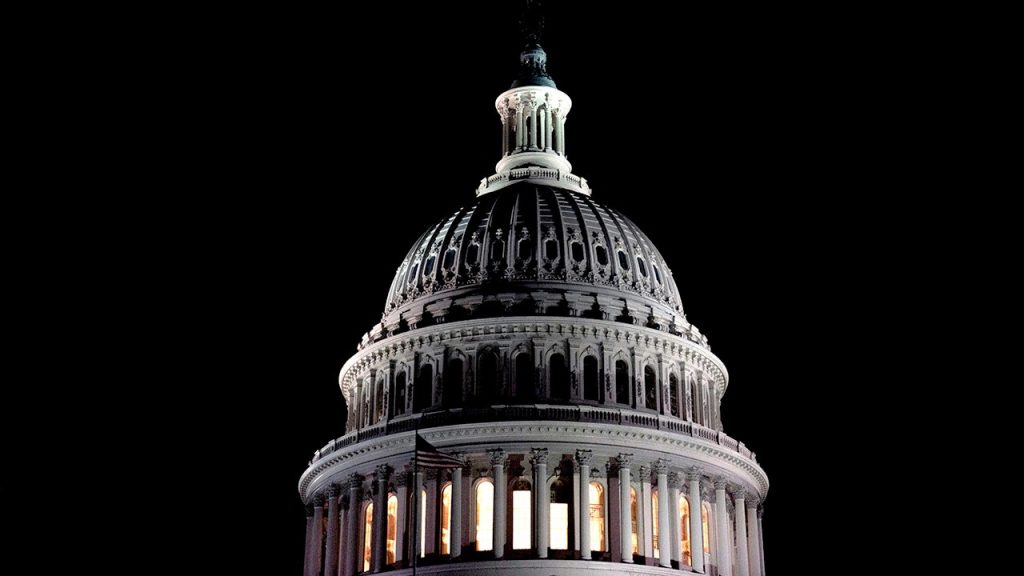The political landscape in Washington is currently engulfed in a high-stakes showdown over government funding, with the looming threat of a shutdown casting a long shadow. A meticulously crafted 1,547-page interim spending bill, designed to avert this crisis, has been effectively torpedoed, leaving lawmakers scrambling for a solution. House Speaker Mike Johnson, the architect of the now-defunct plan, was forced to withdraw the bill after facing a trifecta of opposition from President-elect Trump, Vice President-elect Vance, and influential entrepreneur Elon Musk. Their collective disapproval ignited a groundswell of conservative resistance, effectively rendering the bill politically untenable.
The proposed spending package, intended to fund the government through March 14th, became a lightning rod for criticism due to its perceived bloat and various legislative add-ons, which critics likened to ornaments on a Christmas tree. Conservatives, anticipating a more fiscally restrained approach from Johnson, felt betrayed by the bill’s scope. The timing of Trump’s intervention, occurring at the eleventh hour, further complicated matters. His demand for a concurrent debt ceiling increase, a contentious issue with potential to roil markets and disrupt the legislative agenda, added another layer of complexity to the already fraught negotiations.
Johnson’s abrupt reversal, despite his earlier enthusiastic endorsement of the bill on Fox News, exposes the precarious nature of his leadership and foreshadows the challenges he may face under the incoming Trump administration. The incident suggests that Johnson may be vulnerable to the whims of the new President, a dynamic that could significantly constrain his ability to maneuver legislative priorities. The Speaker’s decision to pull the bill was primarily driven by its profound unpopularity within his own party ranks, exacerbated by the public pronouncements of Musk and President-elect Trump.
The political calculus behind Johnson’s actions is inextricably linked to the upcoming Speaker’s vote on January 3rd. Requiring a majority of 218 votes in a House of 434 members, Johnson faces a precarious path to re-election. The memory of the protracted Speaker’s race in January 2023, which saw Kevin McCarthy finally elected after five days and multiple rounds of voting, serves as a stark reminder of the potential for chaos and gridlock. In a desperate attempt to shore up support, Johnson attempted to sweeten the spending bill with emergency agricultural funding. However, this maneuver proved insufficient, forcing him to abandon the bill entirely and seek an alternative solution.
Ironically, Johnson’s initial aim was to avoid pre-Christmas drama surrounding government funding. However, his efforts backfired spectacularly, culminating in a legislative standoff reminiscent of the 2012 fiscal cliff and the 2014 government shutdown threat. The central question now revolves around Johnson’s next move. Will he propose a “clean” continuing resolution (CR), providing essential government funding without any extraneous provisions? Might he opt for a bill that simply extends current funding levels, coupled with disaster relief? Or will he heed Trump’s call and attach a debt ceiling suspension? The most critical question of all remains whether any proposal can garner sufficient support to pass, particularly without relying on Democratic votes.
Johnson faces a formidable challenge in navigating the conflicting demands of his party. A significant faction of House conservatives opposes any CR, and many are equally resistant to a debt ceiling increase. Even if a new bill is introduced, the insistence by some conservatives on a three-day review period could trigger a government shutdown before the Friday night deadline. The situation calls for a Herculean effort to find a solution. President-elect Trump’s intervention echoes a similar move in December 2019, which precipitated the longest government shutdown in history. Then, a seemingly agreed-upon funding deal, even celebrated with Christmas carols in the Senate chamber, was ultimately scuttled by Trump’s last-minute objections, leading to a month-long shutdown. This historical precedent adds an ominous layer to the current crisis, raising concerns about a potential repeat performance.


